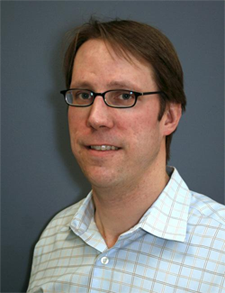Early career scientist earns $450,000 cancer grant
Jay R. Hesselberth, assistant professor in the School of Medicine, is one of five scientists with novel approaches to fighting cancer who are 2012 recipients of the Damon Runyon-Rachleff Innovation Award. The grant of $450,000 over three years is awarded each year to early career scientists whose projects have the potential to significantly impact the prevention, diagnosis and treatment of cancer.
Most early detection strategies for cancer focus on identifying protein biomarkers or “molecular signatures” of disease. However, discovery of new biomarkers has lagged, due in large part to the inability to efficiently sift through complex cellular protein mixtures. As a result, the number of new FDA-approved biomarker tests has declined over the last decade, and the current rate of biomarker validation is only one per year.
Large proteins typically are cleaved into smaller units called peptides for identification and analysis. The current technology for peptide identification is very slow and lacks the sensitivity and specificity required to quantify proteins in complex samples. Hesselberth proposes that a massive acceleration in the rate of peptide sequencing would significantly affect biomarker research. To accomplish this, he seeks to develop a highly parallel peptide sequencing platform with single molecule resolution that is orders of magnitude faster than existing technology. This new approach would transform the capability to identify protein and peptide biomarkers for use in the early detection of cancer.
The Damon Runyon-Rachleff Innovation Award funds cancer research by exceptionally creative thinkers with “high risk/high reward” ideas, but who lack sufficient preliminary data to obtain traditional funding. The awardees are selected through a highly competitive and rigorous process by a scientific committee composed of leading cancer researchers who are innovators themselves. At the final stage of selection, candidates are screened by an in-person interview with committee members. Only those scientists with a strong vision and passion for curing cancer are selected to receive the prestigious award.


